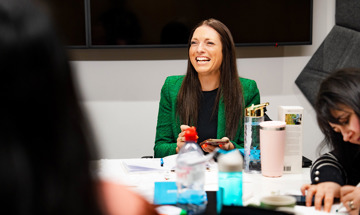More than ever allies are a catalyst in the fight for equality. The community need solidarity, together we are louder, and stronger.
If you are an ally, I would ask yourself, how do you show up when no one is looking? How do you actively advocate for equal treatment for all? Consider taking time this Pride month to educate yourself on the past 50 years of Pride, what amazing things have been achieved and what are we still fighting for.
2022 is an incredibly significant year for Pride. After two years of cancelled parades, Pride in London returns for the first time, and this year, it marks 50 years since the first official parade in the UK.
During that first parade in 1972, LGBTQ+ people faced widespread discrimination, exclusion from institutions and extreme violence. Back then, no businesses or politicians came to support, there were no allies and people would generally avoid any association to the cause. When you look at where we are today, when companies across the world are active sponsors of Pride, and millions of people come together to celebrate, it is very easy to look around and believe the fight is won, but that is far from reality.
As the Co-Chair of Spectrum, Centrica’s LGBTQ+ Network, I’m lucky enough to experience real, active commitment from the company and my colleagues. I’m proud that we’re making Centrica a safe place that allows people to bring their whole self to work.
As we are successful in one momentous change, we lose in so many others. This year, the UK government finally imposed a ban on conversion therapy but excluded Trans people. Across the world, countries are changing laws to allow same sex marriage, but Florida introduces the ‘Don’t Say Gay’ bill. As counties around the world regress on LGBTQ+ rights, the need for Pride month becomes more and more critical.
Small, instrumental steps are more important than ever. This year, Jake Daniels became the UK's first male professional footballer to come out since 1990. Claiming representation in spaces commonly associated with discrimination and violence against LGBTQ+ people is a huge leap forward. Jake will be a role model to so many young people and will be symbolic in showing LGBTQ+ people that safe spaces can be found.
As the Co-Chair of Spectrum, Centrica’s LGBTQ+ Network, I’m lucky enough to experience real, active commitment from the company and my colleagues. I’m proud that we’re making Centrica a safe place that allows people to bring their whole self to work. This year we are growing our internal resources, so our leaders provide thorough and informed support to LGBTQ+ colleagues.

Case Study
Centrica's Market Leading Commitment to Trans Inclusion
Our people

Case Study
Chris O'Shea: The Employment Rights Bill will be good for business.
Our people

Case Study
In conversation with... Victoria Belkhyate
Our people

Case Study
Meet the Fathers of Centrica
Our people

Case Study
Black History Month: Reclaiming Narratives
Our people

Case Study
The Working Parents of Centrica
Our people
